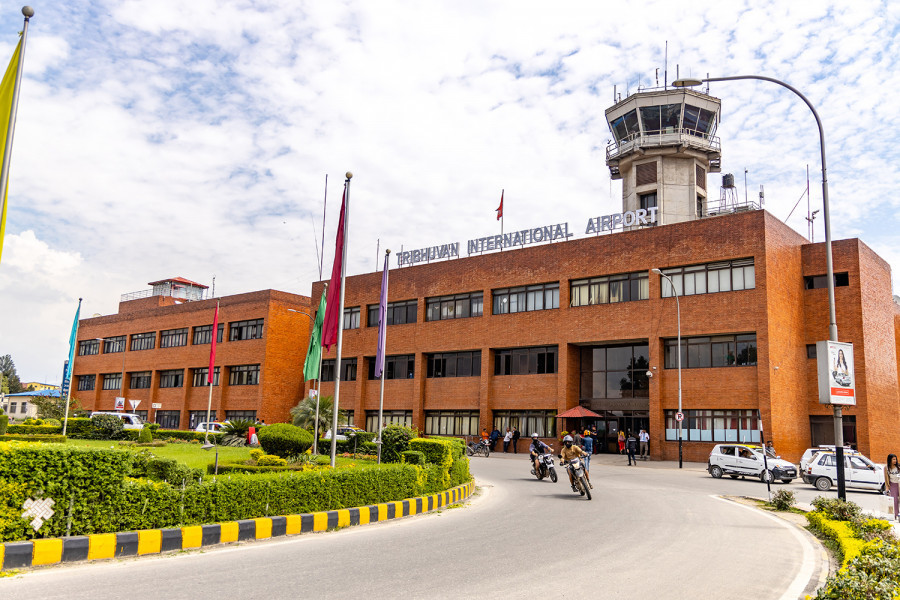National
Police at Kathmandu airport still rely on outdated technology
They still use one-dimension x-ray machines, which have been phased out in most of the world, says airport security chief SSP Krishna Hari Sharma.
Post Report
The Nepal Police seems to be lagging behind in embracing modern technology for crime control. A glaring example is the security arrangement at the Tribhuvan International Airport, where manual machines are still used to screen passengers.
“Airports should employ modern technology like artificial intelligence (AI) tools to detect drugs, explosive materials and gold, but we have not been able to do that in Nepal,” admits Senior Superintendent of Police (SSP) Krishna Hari Sharma who is in-charge of airport security.
“We still rely on outdated one-dimension x-ray machines at the TIA. These machines have almost been phased out in other parts of the world,” SSP Sharma said. “The airport also lacks body scanners. The only equipment used by Nepal Police in the airport are x-ray machines and metal detectors.”
A better equipped airport would considerably cut down on the chances of smuggling of gold and other valuable materials, says SSP Sharma.
Former Deputy Inspector General (DIG) of Nepal Police Hemanta Malla says the force lacks proper instruments as well as manpower when it comes to employing modern technology to combat crimes.
“Although Nepal Police employs technology for daily operations, its use remains grossly inadequate,” Malla says.
The Central Forensic Science Laboratory in Samakhusi, Kathmandu plays a crucial role in examining evidence gathered during criminal investigations. The lab conducts scientific testing and analysis of chemicals, narcotic drugs, explosives, toxicology, DNA, disputed documents, as well as footprint and fingerprint analyses. These tests are carried out using a range of modern technologies.
In addition to CCTV surveillance, which has been used by the police in the Capital Kathmandu and various other cities and towns across the country, lie detectors, polygraphs, and voice analysers are some of the other technologies the police use.
The chief of Cyber Bureau of the Nepal Police Nabinda Aryal says the force has been using modern technologies to detect criminal activities.
According to cyber security expert and former DIG of Nepal police Rajiv Subba, AI is mainly used in Nepal’s educational system. He says Nepal lacks the infrastructure to effectively use artificial intelligence for security.
The high costs associated with AI subscription and hardware installation have hindered Nepal’s ability to integrate the technology into the security sector, according to experts
Subba, however, mentioned that certain AI tools could be used in airports without spending too much. “Since November 2021, Nepal has been issuing e-passports, which can be easily integrated with the facial recognition CCTV systems. This makes it easier to verify whether a person presenting a passport matches the person pictured.”
Of late, many countries have integrated facial recognition technology into their airports. “This is something which can be done in our airport, too,” Subba said.
Nar Bahadur Thapa, head of Tribhuvan International Airport immigration department, says that installing a facial recognition system is not yet a priority. "We are in the process of expanding desks and increasing manpower at the airport immigration."
A police officer at the Kathmandu sub-district police office, Ranipokhari, claims that facial recognition technology is being installed in CCTV cameras at several locations throughout the city.
The technology used by the police at various places in the city can also be used at the airport. However, Thapa, the head of airport immigration, says that until the ministry approves a budget, the immigration department alone cannot do anything.
AI works based on its algorithms, which can identify anomalies, forecast possible dangers, and notify airport staff in advance by evaluating data from several sensors and systems. AI is able to recognize possible hazards like lost luggage and to detect unauthorised intrusions.
In the past few years there have been multiple cases of smugglers carrying huge loads of gold passing through TIA security undetected.




 10.12°C Kathmandu
10.12°C Kathmandu














